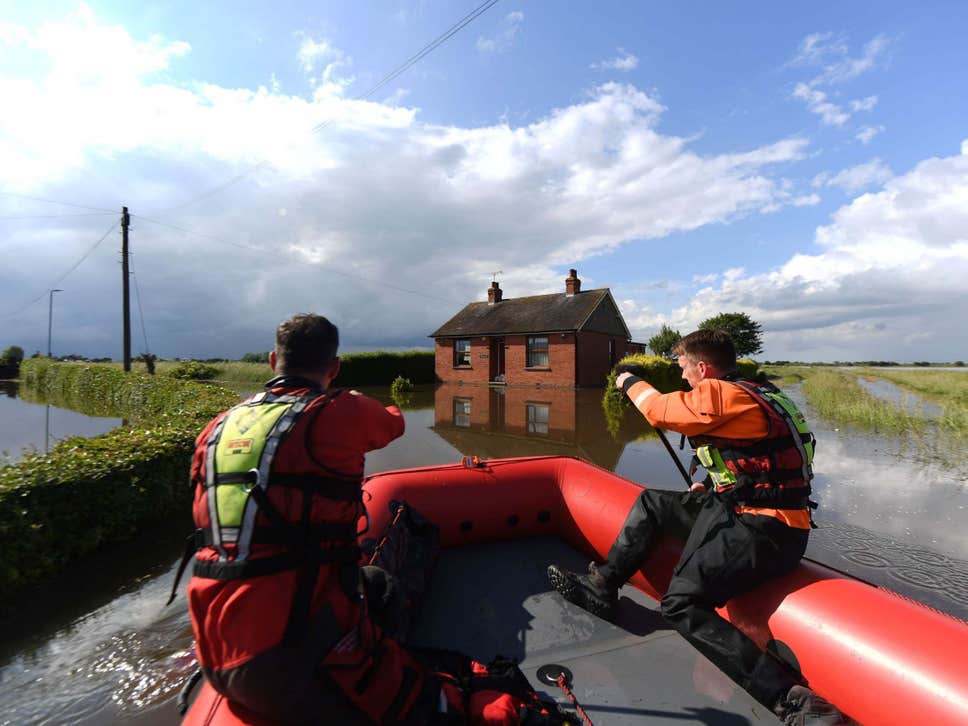
Lost among the latest barrage of national and international news events is the ongoing nightmare faced by almost 600 households unable to return to their homes in Lincolnshire because of flooding.
Last week the River Steeping burst its banks following heavy rains. More than 580 homes in the Wainfleet area were evacuated, with flooding directly affecting around 130 homes and 1,000 people still unable to return.
It’s the latest case of extreme weather to hit the UK. Extreme meteorological events can be deeply upsetting for the people directly affected and seriously unnerving for everyone else.
But they are increasingly regular and the financial impact will affect all of us in the short-term as well as the long. The trend is already costing insurers.
The Association of British Insurers (ABI) reports that the extreme freeze that hit the UK early in 2018 resulted in insurers paying a record £194million in a three-month period for burst pipes.
Then 2018’s extreme heatwave led to more than 10,000 households needing to claim for damage caused by subsidence, at a cost of more than £64million.
“With the risk of flooding increasing, then the only sustainable option insurers have is to adjust their risk prices accordingly,” warns Samuel Leach, director of Samuel and Co Trading.
“In the long run the knock-on effects from rising premiums could pose a threat that could become a social issue, as affordability is so critical for some people on low and average incomes.
“In general, you can’t prove that a single event is the result of climate change but it is likely to cause more such events of greater severity. If insurers conclude that climate change was a significant contributory factor to the event, companies will start thinking carefully about the pricing and availability of similar insurance policies.”
Summer rain
Strangely, the warmer months can cause flooding risks. Jessica Turner, catastrophe advisory senior vice president at Guy Carpenter, explains: “The warmer months tend to be more prone to flash flooding as the land surface heats up during the day, causing powerful updrafts and sometimes convective storms.
“These storms can lead to large bursts of rain falling within short periods of time and in localised areas.
“Climate change and an increase in urban development can contribute to the threat of surface water flooding.
“Older drainage systems, some of which were originally installed in the 1800s, are often not updated and can be overwhelmed by the increase in rainfall on paved surfaces, which can’t absorb water.”
Increased risk makes it even more essential that householders ensure they have sufficient protection in place.
“It is really important that people check that they are adequately covered for major repair and rebuilding costs should their property be affected by extreme weather,” Jason Smith, CEO of MoneyExpert, says.
“People need to fully cost up the value of the contents in their property so they can be replaced in the event of them being destroyed, or damaged, beyond use in the event of a major fire or flood.
“If you are unlucky enough to be affected then you should immediately contact your insurer who [will be] geared up to provide the support and help that you will need in those difficult circumstances.”
But Ben Stansfield, sustainability focused partner at law firm Gowling WLG, says more climate change-related damage is on the horizon.
“Climate change will cause more unpredictable storms with greater power, so trees, fences [and] trampolines will all be blowing around hitting buildings,” he says.
“It’ll also impact utilities serving homes and businesses – power, sewers – which has indirect effects when they go down. Storms cutting power lines will also impact EVs [electric vehicles], unless we improve on how we implement energy storage.
“Finally, droughts will cause shrinkage in the ground, and then cracks and subsidence.”
Corporate concerns
Concerns about climate change go far beyond individuals. Financial entities are increasingly vocal about their worries.
MoneyExpert's Smith says: “The financial industry is extremely concerned about the impact of climate change on insurance premiums, making it increasingly difficult to provide affordable protection against natural disasters in the UK, as well as globally.
“So much so that the UK’s leading insurers have come together under the ClimateWise initiative to identify solutions to these critical challenges and are actively seeking to promote ways to avoid and mitigate against the impact of climate change.”
The ABI is a founding member of ClimateWise, a global insurance industry collaboration focused on driving action on climate change risk.
The ABI’s director general, Huw Evans, recently said: “Insurers are on the front-line dealing with the results of rising temperatures and changing investment needs, and so understand better than most the serious implications of a changing climate.
“We need a sustained and ambitious response to protect homes, businesses and communities around the world. The UK also needs to build its resilience to severe weather, ensuring vital flood defences keep pace with climate change and helping people take steps to improve their own protection.”
Perhaps global finance will succeed in applying pressure to governments to act faster to mitigate and reduce climate change. In the meantime, customers should check their insurance policies are adequate to protect them if they too fall victim to extreme weather.